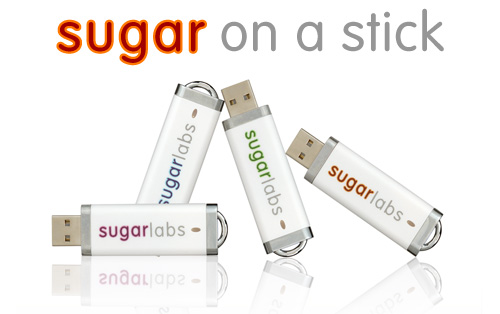Difference between revisions of "Sugar on a Stick/Blueberry"
Jump to navigation
Jump to search
m (beginning to draft release notes up) |
m (some updates; add windows content) |
||
| Line 7: | Line 7: | ||
: ''a Sugar environment you can carry in your pocket - '''this is a draft - work in progress''''' | : ''a Sugar environment you can carry in your pocket - '''this is a draft - work in progress''''' | ||
| − | + | :'''TODO:''' new splash image is needed | |
| + | :'''TODO:''' work website content out | ||
| + | :'''TODO:''' add further instructions | ||
| − | + | This document provides instructions for preparing a Sugar on a Stick (SoaS) installation. It also contains a list of known issues and sources of further information, for example how to use a Boot Helper CD for very old PCs. | |
| − | |||
| − | |||
| − | === | + | === Get it! === |
| − | + | Please select your operating system by clicking on one of the icons below. | |
| + | |||
| + | [[Image:Windows.gif|link=Sugar on a Stick/Blueberry#Windows_Users]] | ||
| + | [[Image:Gnulinux.png|link=Sugar on a Stick/Blueberry#GNU.2FLinux_Users]] | ||
| + | [[Image:Apple.gif|link=Sugar on a Stick/Blueberry#Mac_Users]] | ||
| + | |||
| + | ==== Windows Users ==== | ||
| + | |||
| + | :'''TODO:''' add screenshots | ||
| + | |||
| + | # Download the latest version of Fedora ''LiveUSB Creator'' from http://fedorahosted.org/liveusb-creator/ and extract it; | ||
| + | # Plug a target USB flash drive into your computer (minimum 1-gigabyte); | ||
| + | # Launch ''LiveUSB Creator''; | ||
| + | # Select ''Sugar on a Stick (Blueberry)'' in the drop-down menu on the upper-right side of the ''LiveUSB Creator'' window; | ||
| + | # Set the ''Persistent Storage'' slider to the maximum so you can save your Sugar work onto the USB device; | ||
| + | #:(You may allocate as much storage as there is capacity on your device. You may allocate less than the maximum, if you want to use some of the device storage when not booting Sugar.) | ||
| + | #: If you repeat this installation on a device after having saved some Sugar work or changes, all Sugar work and changes will be lost. | ||
| + | # Select your USB flash drive as the target; | ||
| + | # Click the ''Create Live USB'' button and then wait for the process to finish (the time required will depend mostly on your download speed); | ||
| + | # Close the ''LiveUSB Creator'' program; | ||
| + | # When ejecting the USB flash drive from the computer, first stop the device with the ''Safely Remove Hardware'' dialog. | ||
| + | |||
| + | ==== GNU/Linux Users ==== | ||
| + | |||
| + | :'''TODO:''' we'll use image-writer here | ||
| + | |||
| + | ==== Mac Users ==== | ||
| − | + | :'''TODO:''' need to add and test instructions here | |
Revision as of 11:46, 7 November 2009
Project Home · Get Involved · Contacts · Resources · FAQ · Roadmap · To Do · Meetings
Sugar on a Stick - Blueberry
- a Sugar environment you can carry in your pocket - this is a draft - work in progress
- TODO: new splash image is needed
- TODO: work website content out
- TODO: add further instructions
This document provides instructions for preparing a Sugar on a Stick (SoaS) installation. It also contains a list of known issues and sources of further information, for example how to use a Boot Helper CD for very old PCs.
Get it!
Please select your operating system by clicking on one of the icons below.
Windows Users
- TODO: add screenshots
- Download the latest version of Fedora LiveUSB Creator from http://fedorahosted.org/liveusb-creator/ and extract it;
- Plug a target USB flash drive into your computer (minimum 1-gigabyte);
- Launch LiveUSB Creator;
- Select Sugar on a Stick (Blueberry) in the drop-down menu on the upper-right side of the LiveUSB Creator window;
- Set the Persistent Storage slider to the maximum so you can save your Sugar work onto the USB device;
- (You may allocate as much storage as there is capacity on your device. You may allocate less than the maximum, if you want to use some of the device storage when not booting Sugar.)
- If you repeat this installation on a device after having saved some Sugar work or changes, all Sugar work and changes will be lost.
- Select your USB flash drive as the target;
- Click the Create Live USB button and then wait for the process to finish (the time required will depend mostly on your download speed);
- Close the LiveUSB Creator program;
- When ejecting the USB flash drive from the computer, first stop the device with the Safely Remove Hardware dialog.
GNU/Linux Users
- TODO: we'll use image-writer here
Mac Users
- TODO: need to add and test instructions here


